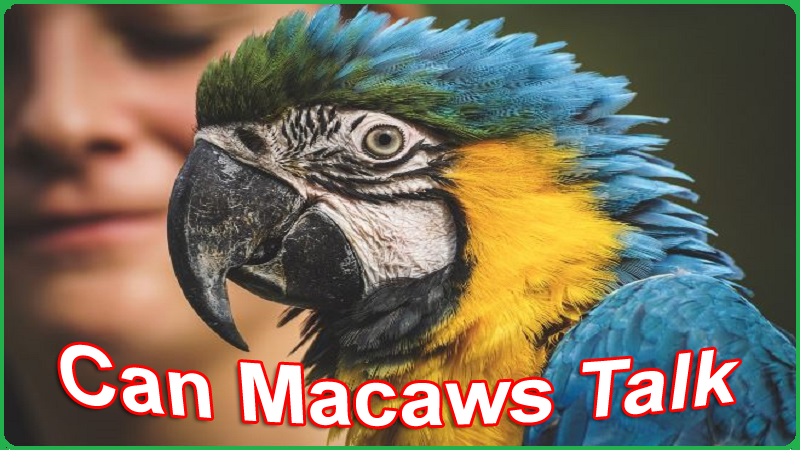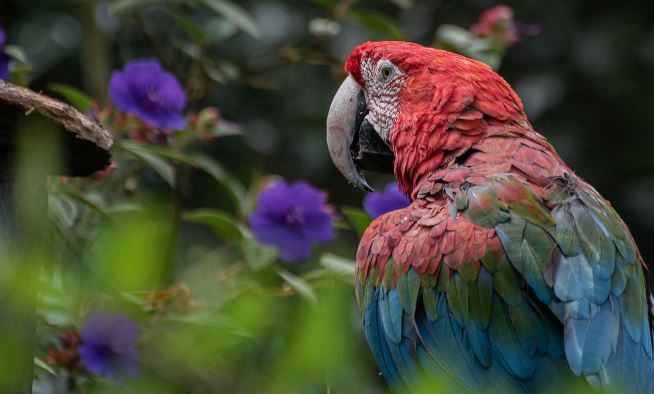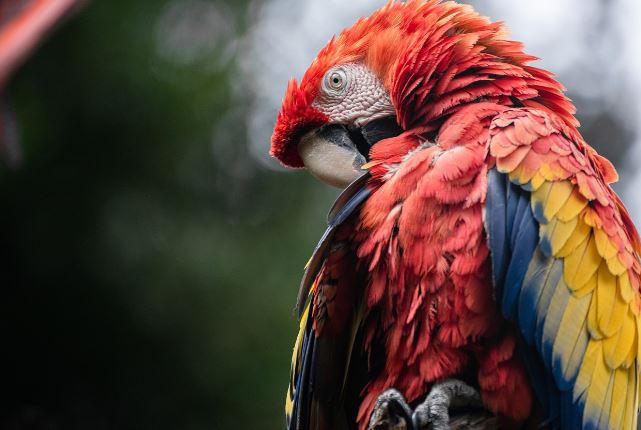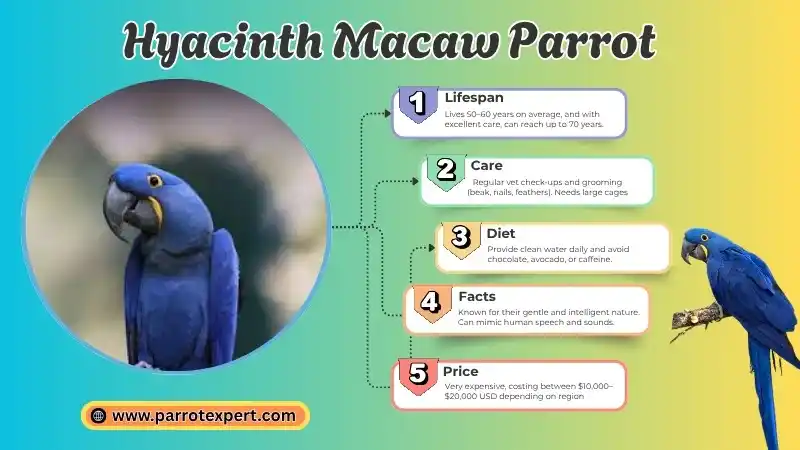One of the main reason of raising parrots that have a ability to talk with humans. So, human beings do more fun with chatting to your pet, and can also learn new phrases together. Although, sometimes many people have confusion that all parrots can easily talk. But, now we will discuss about the macaw? Can macaws talk?
In short, yes! Macaws are able to talk with human and learn. Many species of parrots are available in the world, but these parrots are the best to keep learn quickly and talking clearly. Macaws are capable to learn up to 300 words, but it depends on the kind of species from which they are belonging.
This is unique article on the Internet. So, from this post, you will get complete guide in details about macaws learning and talking behavior with their vocalizations. And, it also spread the light on how you can train your Macaw to talk with easily tips and tricks.
Do All Macaws Talk?
Not, all macaws talk. Most of parrots, including macaws, have capability to mimic sounds and words, but the extent to which they talk varies among individuals. Some macaws can’t learn to repeat human words, but others have able to develop a significant vocabulary.
Some factors can impact their talking abilities, like as bird’s personality, environment, and human’s interaction level. Parrots enable with natural behavior that serves to mimic sounds and words.

With helping of these sound, they can communicate and social integration within their flock and humans. Macaws also produce the mimic sounds and words as like other parrots.
But, it is not possible that all macaws are capable to talk extensively as seen in the experiences shared in the sources.
How Much Can Macaws Learn?
Macaws have the ability to learn a significant vocabulary of human words and phrases, but the extent varies among individuals. Here are some aspects of what macaws can learn:
Also Read: Do Cockatoos Talk? Talking Abilities of Cockatoos
Speech and Mimicry
Vocabulary: Many macaws can learn to mimic human speech, although their vocabulary may be limited as compared to other parrot species. They can also learn various words and phrases. But, for this, they have to need consistent training and interaction.
Sounds: Macaws can mimic many environmental sounds, such as doorbells, alarms, and other household noises.
Tricks and Behaviors
Trick Training: Easily can be trained macaws to perform many tricks, like as waving, playing dead, and rolling over.
Behavioral Training: They can also train for practical behaviors, such as stepping up onto a hand, and staying in designated area.
Problem Solving
Puzzles: Macaw parrots can solve simple puzzles and manipulate objects to obtain rewards. They enjoy also challenges that stimulate their cognitive abilities.
Foraging: They can easily learn to forage for food. This involves finding hidden treats, how to extract food from foraging toys.
Social Interactions
Recognizing Individuals: Macaws are able to recognize and distinguish between different people and animals. They often form strong bonds with their human caregivers.
Responding to Commands: With training, macaws can respond to basic commands like “come,” “stay,” and “no.”
Emotional Intelligence
Expressing Emotions: Macaws can also express many emotions. It can often sense and respond to the emotions of their human companions.
Bonding and Socialization: They can develop deep social bonds and engage in complex social interactions with humans.
Environmental Adaptation
Adapt to Changes: Macaws can adapt to new environments and changes in their routine. But, they may need time and gradual introduction to new situations.
How Do You Teach Macaws to Talk?
Teaching a macaw to talk, you should keep patience, consistency, and positive reinforcement. Here are some key steps to help guide the process:
Also Read: Can Parrotlets Talk? Myth or Reality
Make a Comfortable Environment
- Ensure your macaw feels safe and comfortable in its surroundings. A stressed or anxious bird is less likely to learn.
- You always try to build good bond with your macaw through regular interaction.
Start with Simple Words
- Begin with simple words like “hello,” “goodbye,” or the macaw’s name.
- You can use these words consistently in appropriate contexts that help to macaw understand their meaning.
Repetition and Consistency
- Repeat the selected words or phrases frequently throughout the day.
- Should use a clear, enthusiastic tone to make the words more engaging and easier to mimic
Use Positive Reinforcement
- You should offer reward your macaw with treats, praise, or affection, whenever it attempts to mimic a word or sound.
- Reinforcement should be immediate to help the bird connect the action with the reward.
Interactive Sessions
- You should spend dedicated time each day interacting with your macaw, and focusing on talking practice.
- You can make the session’s fun, and engaging to keep your bird interested.
Imitate Sounds and Actions
- Pair words with actions or objects to create associations. For example, say “hello” while waving.
- Macaws often learn better through imitation, so you can demonstrate the sounds you want them to make.
Use Media and Recordings
- Play recordings of the words that you want your macaw to learn.
- Ensure the recordings are clear and at a moderate volume.
Be Patient and Persistent
- It can take more time for learning to talk, and progress may be get slow. So, you should have enough patient and persistent with training.
- Make celebration their small victories and gradual improvements.
Encourage Social Interaction
- Macaws are social birds. So, they can learn from interacting with multiple people.
- Your family members are also participate in this training.
Monitor and Adapt
- Pay attention to which words your macaw responds to best. So, you have to adjust your training accordingly this.
- If your macaw shows interest in certain sounds or words, then add those into your training.
What Sounds Macaw Can Produce?
Macaws are capable of producing a large range of sounds. Here are some of the types of sounds that macaws can produce:
Also Read: Do Cockatiels Talk? A Guide to Their Vocal Talents
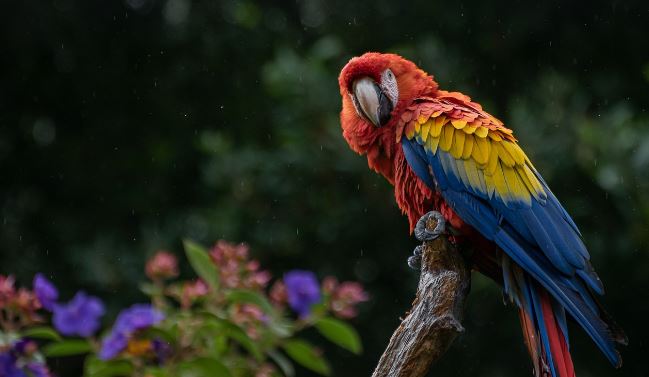
Vocalizations
Squawks: Loud, piercing calls that can be heard over long distances. These are often used in the wild to communicate with flock members.
Screeches: High-pitched and intense sounds that can indicate excitement, distress, or call for attention.
Chattering: Soft, repetitive sounds that macaws often make when they are socializing.
Whistles: Macaws can produce various whistle tones. They might use to mimic other birds or sounds they hear in their environment.
Mimicry of Human Speech
Words and Phrases: Many macaws can learn to mimic human speech, repeating words and phrases they hear frequently. The clarity of their speech can vary, but some can become quite articulate.
Voice Tone and Inflection: Macaws can mimic the tone and inflection of human voices. They often capture the emotional tone of the words.
Imitation of Environmental Sounds
Household Noises: Macaws can mimic everyday sounds, including doorbells, telephones, alarms, and microwaves.
Animal Sounds: They might imitate the sounds of other animals, such as dogs barking, or cats meowing.
Nature Sounds: Macaws can replicate natural sounds they hear, like water dripping and wind blowing.
Emotional Expressions
Purring: A soft and low sound often made when a macaw is being affectionate.
Growling: A low, guttural sound that can indicate displeasure, fear, or aggression.
Hissing: A defensive sound usually made when a macaw feels threatened or cornered.
Interactive Sounds
Clicking: Some macaws make clicking sounds with their beaks. They can be a sign of curiosity or a way to attract attention.
Rasping: Rough, scraping sounds produced by rubbing their beaks against objects, often part of grooming or exploring behaviors.
Why Are Macaws Better than Other Birds?
Macaws are not just “better” than other birds, but they do have some unique characteristics, including:
Also Read: Where Do Parrots Live? Exploring Their Diverse Habitats
Generally, macaws are very large, colorful parrots with long tail feathers. Their bare facial areas vary in size and pattern by species. They are good entertaining birds as pets, cause of their vibrant colors and friendly, extroverted temperament
Macaws are highly intelligent, and can easily learn to mimic human speech. They have ability of learning words and phrases. With using of their advanced vocal, they can easily communicate with each other using specific clicks in the wild.
Macaws like often fly in large flocks and the bonded pairs fly close together. This social nature makes them engaging companions.
How Much Time Does It Take for Macaws to Learn?
The time it takes for macaws to learn can vary depending on the specific behavior or skill being taught. Macaws have capable to learn new behaviors at different cycle in their lives. For example, 25-year-old macaws are learning trick training for the first time, and even 85-year-old macaws also learning new behaviors.
However, training a macaw parrot, you have requires patience, consistency, and positive reinforcement. So, you should start training them when they are young, because this stage is better receptiveness to learning new things.
Therefore, learning period can range from a few days to weeks. But, it depends on the complexity of the behavior being taught, bird’s receptiveness, and training routine.
How Do Macaws Choose Their Mate?
Macaws select their mates through a social interaction, physical fitness, and mutual bonding behaviors. Here’s how the process generally works:
Also Read: A Closer Look at African Grey Bite and its Causes, Prevention, & Training
Social Interaction: In the wild, macaws live in flocks that provide ample opportunities to interact with potential mates. Young macaws engage in social activities within the flock that helps to become acquainted with other individuals.
Courtship Displays: During the mating period, macaws show many courtship displays to attract a mate. These include, elaborate vocalizations, feather displays, and aerial acrobatics.
Mutual Preening: Preening each other’s feathers is a common bonding behavior among macaws. Mutual preening is a sign of affection and trust.
Feeding Rituals: Macaws may also engage in courtship feeding, where one bird offers food to the other. This activity supports to build a healthy bond.
Vocal Communication: Macaws also use many vocalizations to communicate with potential mates. These calls are helpful to build-up a good connection.
FAQs (Frequently Asked Questions)
At What Age Do Macaws Start Talking?
Macaws are able to start mimicking sounds and words in few months old. But, they typically begin to talk more clearly and consistently about 6 months to a year old.
Can Macaws Understand Humans What They Are Saying?
Macaws are unable to understand language in the same way humans do. Generally, they mimic sounds they hear often. They can associate certain words with specific actions or responses. So, they do not grasp the meaning of the words as humans do.
Is It Necessary to Train a Macaw to Talk?
It is not necessary provide a training a macaw to talk. But, you can make a fun for both the bird and its owner. This activity helps to make a best stimulation the bird mentally.
Conclusion
If you are taking decision for adopting, as well as want to get know about macaws talking behavior. Then, we will favor you, because macaws are more favorable for humans in the respect of learning and talking as compared to other species of parrots.
Also Read: Why Do Parrots Shake Their Heads? Causes and Insights
Is this article useful for you? If yes! Then please share it along with your friends, family members, pet lovers or relatives over social media platforms like as Facebook, Instagram, Linked In, Twitter, and more.
Do you have any experience, tips, tricks, or query regarding on this? You can drop a comment!
Have a Nice Day!!

